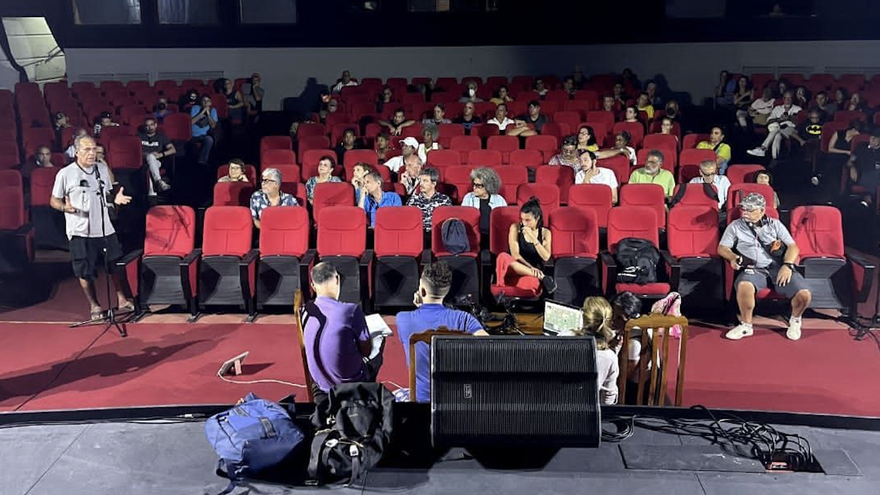
![]() 14ymedio, Havana, 5 July 2023 — A half-hour blackout delayed the Assembly of Cuban Filmmakers’ meeting scheduled for Monday at 9am at the theater on 23rd and 12th in Havana. The producers, who had invited about thirty professionals from other provinces and those living abroad to join the meeting via Internet, proposed creating “an organizational structure” to consolidate its functions.
14ymedio, Havana, 5 July 2023 — A half-hour blackout delayed the Assembly of Cuban Filmmakers’ meeting scheduled for Monday at 9am at the theater on 23rd and 12th in Havana. The producers, who had invited about thirty professionals from other provinces and those living abroad to join the meeting via Internet, proposed creating “an organizational structure” to consolidate its functions.
Among the main topics addressed were the need to revise the Film Law, “the drafting of which should include professionals from the guild such as the G-20 group”, whose members — among them directors Fernando Pérez and Rebeca Chávez — have since 2013 presented to authorities proposals similar to that of the Assembly. Furthermore, they discussed the noxious reach of Decree-Law 373, which regulates the audiovisual and cinematographic creation and the restoration of censored works and authors.
Other topics debated were the safeguarding of Cuba’s cinematographic heritage, the autonomy of the Fondo de Fomento del Cine Cubano [The Fund to Encourage Cuban Film] — a state scholarship designated to support production–and the possibility to join, in a single organization, all Cuban filmmakers, regardless of whether or not they live on the Island.
In the Assembly’s declaration, published on Tuesday on its official Facebook page, the group expressed their disagreement with the response from government and Communist Party authorities to their formal complaints presented on June 23 in Havana’s Chaplin Theater and they demand that institutions focus on “complying with their true social function, without infringing on the artists.”
The systematic protests resulted from the illegal airing on Cuban Television of director Juan Pin Vilar’s and producer Ricardo Figueredo’s documentary, La Habana de Fito, and they’ve prepared the ground to discuss other important topics with the regime’s cultural representatives, such as the constant censorship of works and independent creators and the unjustified suppression of spaces such as Muestra Joven [Young Sample], dedicated to exhibiting works of creators younger than 35 years old.
With regard to Pin Vilar’s documentary, the Assembly demanded that the Cuban Institute of Cinematographic Art and Industry (Icaic), the Ministry of Culture and the Institute of Information and Social Communication (IICC) clarify the “exceptionality criteria” referenced as the justification to illegally air the documentary and they demanded “an compensatory response from those responsible for the events, to these filmmakers, and the Cuban artistic community.”
The creators also announced the revision of the Assembly’s structure, which will be divided into four commissions in charge of managing the group’s internal affairs: cultural policy, censorship and exclusion, laws and decrees, and production. Each member of these working groups “will be selected by votes”, they agreed.
The event attendees also stated that “neither representatives of government institutions nor the press participated” and that the meeting was filmed “from within”, in contrast to the meeting that occurred with government officials on June 23, during which leaders opposed the filming of the meeting by the filmmakers that were present. Despite all this, filmmaker Miguel Coyula managed to publish several clips of audio and video taken during the meeting.
To date, the group’s initial declarations against the unethical procedures of Cuban Television have been signed by more than 600 filmmakers, intellectuals, artists, which suggests a direct questioning of the regime’s cultural policies.
“I congratulate you, you are creating a precedent to dialogue with officials,” wrote professor Alina Bárbara López — who has been harassed for weeks by State Security in Matanzas — in the comments at the bottom of Tuesday’s declaration. In addition, she urged the creators to continue contributing “to the present and future, not only of Cuban culture, but to the current politics of the nation.”
Translated by: Silvia Suárez
____________
COLLABORATE WITH OUR WORK: The 14ymedio team is committed to practicing serious journalism that reflects Cuba’s reality in all its depth. Thank you for joining us on this long journey. We invite you to continue supporting us by becoming a member of 14ymedio now. Together we can continue transforming journalism in Cuba.
